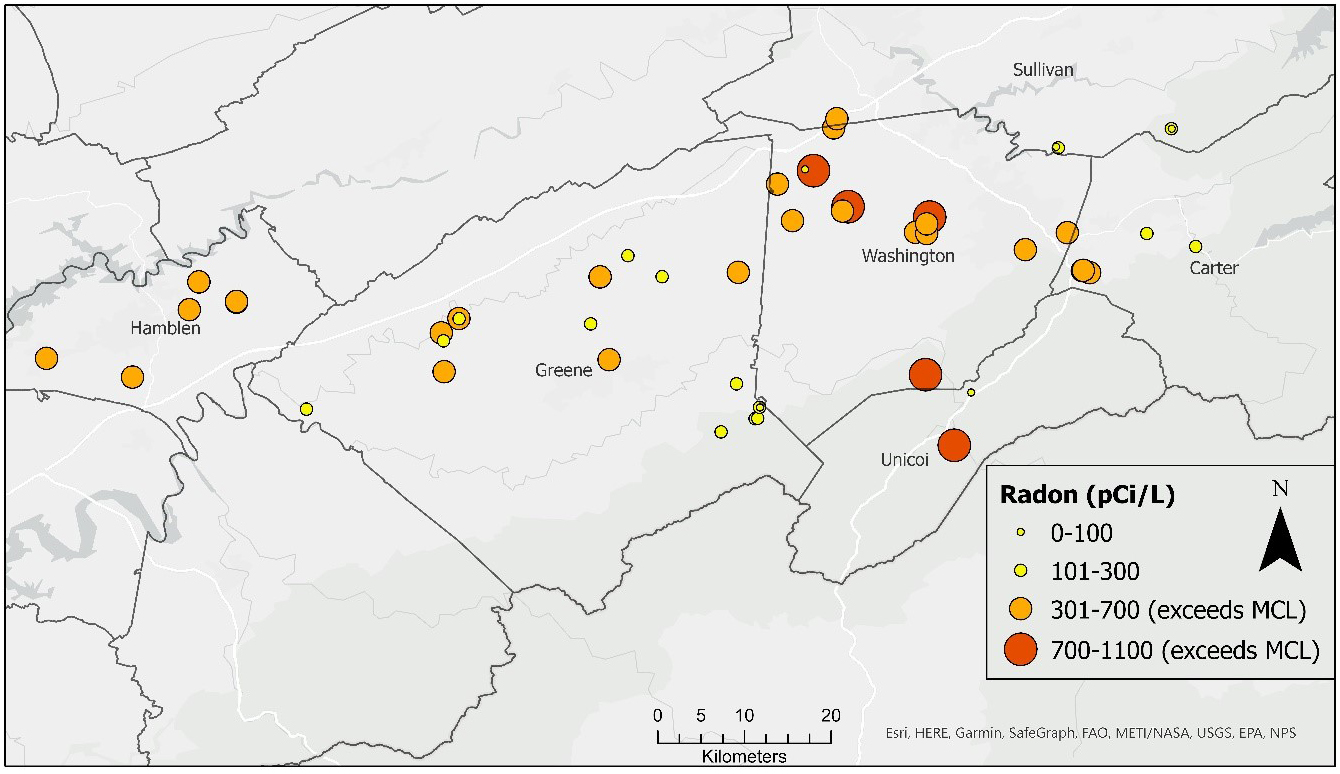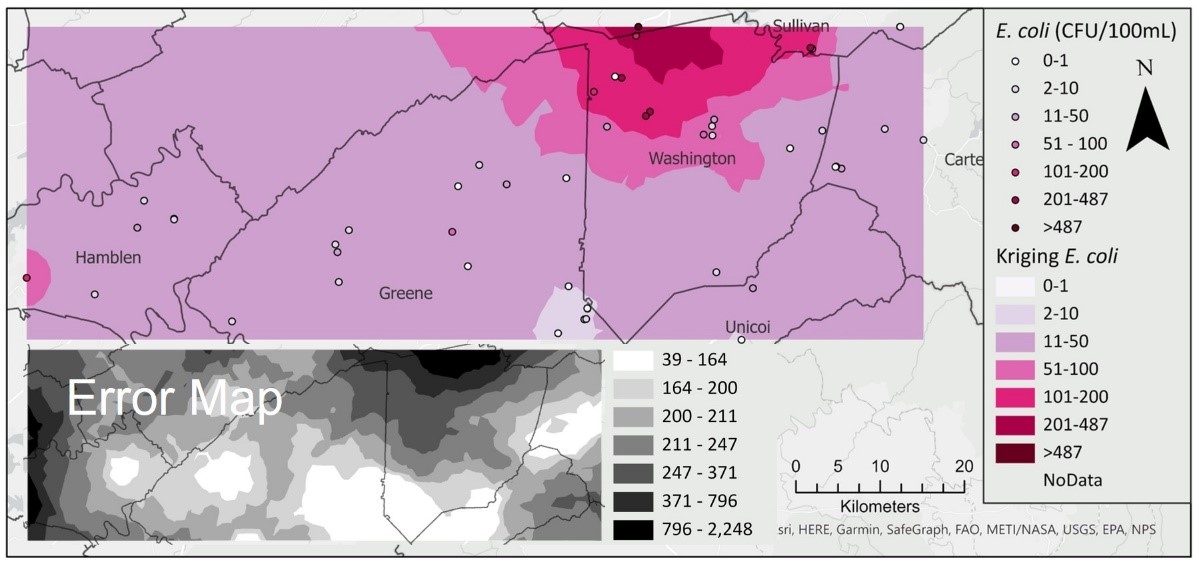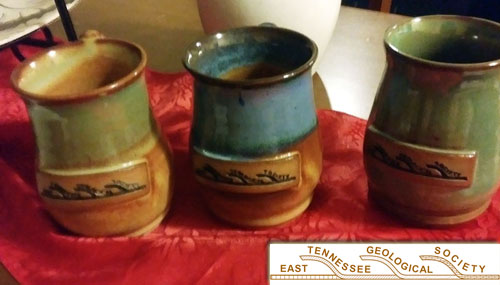EAST TENNESSEE GEOLOGICAL SOCIETY
January 2023 Virtual Meeting
Monday,
January 9, 2023
6:00 - 7:30 pm
Note: ETGS members will receive an email with info for logging into the meeting.
January Presentation
Geospatial Analysis and Water Quality Index Assessment of Karst Spring Water
Quality in Northeast Tennessee
By
Lukman Fashina1, Ingrid Luffman2,
Andrew Joyner2, and Nandi Arpita2
1PhD Student,
Department of Geography and Sustainability,
University of Tennessee, Knoxville
2Department of Geosciences, East Tennessee State University
Abstract
Karst springs are an essential source of private water supply for
about 10% of households in Tennessee. However, regulatory monitoring
does not exist for private (drinking) water quality in the state,
unlike for public water systems. Private water users are advised
only to periodically test for contaminants in their springs or
domestic wells. Water quality is spatially and temporally dynamic,
and more prominently so in a karst environment. Therefore, this
study investigates the water quality of roadside springs in
Northeast Tennessee. Karst springwater samples collected from 50
springs in six counties of east Tennessee were assessed for
pathogens, nutrients, radon, and physicochemical parameters. All but
five samples contained E. coli, while all samples contained total
coliform. High E. coli and total coliform were spatially clustered
(Local Moran's I = 0.177 and 0.147, pseudo p-value = 0.012 and 0.02,
respectively) in regions of high agricultural land use, resulting in
a fecal contamination hot spot on the border of Washington and
Sullivan Counties, Tennessee. Radon concentrations exceeded the 300
pCi/L proposed MCL in 29 (58%) of springs, with one spring in Unicoi
County exceeding 1,000 pCi/L. A radon hot spot was identified at
northern Washington County (Local Moran's I = 0.160, pseudo p-value
= 0.014). Other parameters, including nitrate, pH, and TDS, were
within recommended ranges for drinking water. The water quality
index (Brown et al., 1972) results showed that 12% and 88% of
samples were in very poor, and unfit for drinking conditions
respectively. From analyses, agricultural land use and lithological
contributions from springwater-rock interaction were the major
factors controlling fecal and radiological contaminations. These
findings will help to identify poor springwater quality zones that
will be of interest to springwater users in the region.


Biography
Lukman Fashina is an Isobel Griscom Fellow
pursuing his doctoral study at the University of Tennessee,
Knoxville, where his research interests focus on GIS, remote
sensing, environmental change monitoring, and hydrologic modeling.
His previous research explored the water quality of karst springs as
a private water supply source in northeast Tennessee, and GIS-based
DRASTIC modeling assessment of intrinsic groundwater vulnerability
to contamination in Pennsylvania.
In addition to his professional experience as a researcher in a
policy think tank, he recently participated in the NASA DEVELOP
National Program where he worked on a team that used NASA Earth
observation data to monitor surface water extents of remote stock
ponds in the southwestern United States for enhanced water resources
management.
He holds a B.Sc. in Geology from the University of Ibadan, Nigeria,
and M.S. degrees in Sustainable Water Management (Water, Energy, and
Food track) from Tufts University, and Geosciences (Geospatial
Analysis concentration) from East Tennessee State University.
Among his numerous honors and awards, Lukman is an American Water
Resources Association's (AWRA) Rising Star 2021-2022 and an awardee
of the Richard A. Herbert Memorial Graduate Masters Division
Scholarship. When he is not studying, he enjoys volunteering and has
previously volunteered in numerous educational and community
development services.
![]()
Greetings! We
hope you will join us for the next ETGS virtual meeting, and that
you, your
family, and your colleagues are staying healthy and well.
As a courtesy, please mute your cell phone or the microphone in your laptop/tablet to minimize background noise and feedback echoes. We will try to mute all participants until the presentation is finished. Please use the chat feature to type comments or questions during the presentation. We recommend that you send questions for the speaker to "everyone" so all participants can see the question. After the presentation, the speaker will answer questions. During this Q&A period, you may unmute if you wish to ask a question verbally.
We will create an attendance list based on the participant names we can see during the meeting. This is helpful for those who need to document participation to support Professional Geologist registrations. It is not always possible to tell who is participating, especially for those joining by phone, so please email your name to etgs@live.com to be listed on the attendance sheet. Let us know exactly how your name should appear on the list.
Thank you for your patience and understanding as we continue adapting to this virtual format. As always, we welcome and appreciate your feedback and suggestions for improvement.
ETGS News:
-
ETGS mugs are available! If you would like to purchase a mug, email etgs@live.com and include "ETGS Mug" in the subject line.
|
|
ETGS Coffee Mugs... Sure to be a collector's item! |
 |
We look forward to seeing you at the next meeting.
ETGS is a volunteer organization. We need your help to
continue serving those interested in the geology of East
Tennessee and beyond. Please email us at
etgs@live.com
if you would consider assisting in one of the following open
positions. It is a great opportunity to expand your personal
and professional network.
President
David Carlone
Vice
President
Open
Secretary
J.
Brad Stephenson
Treasurer
Seaira Stephenson
Webmaster/Social Media Coordinator
Bob
Gelinas
Page updated May 10, 2023 |